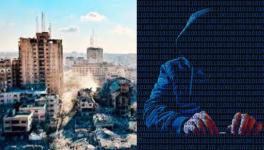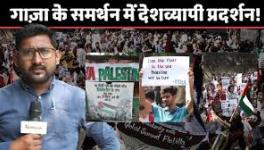As Violence Soars in the West Bank, Leaders Seek Coexistence Between Peace and Occupation
During the month of October tensions mounted in Israel and Palestine, raising the Palestinian death toll to at least 56 and the Israeli death toll to 11. Thousands of Palestinians protested in the West Bank on Tuesday, demanding that Israeli authorities hand over the bodies of 17 Palestinians recently killed by Israeli troops. Protesters were met with force by Israeli security forces, leaving 143 people wounded. Now an international quartet made up of the U.S., the EU, Russia, and the UN have been tasked with restarting a peace process. On Monday EU foreign policy Chief Federica Mogherini called for concrete steps to be taken to resume the peace process.
SHARMINI PERIES, EXEC. PRODUCER, TRNN: Welcome to the Real News Network. I'm Sharmini Peries coming to you from Baltimore.
During the month of October tensions mounted in Israel and Palestine, raising the Palestinian death toll to at least 56 and the Israeli death toll to 11. Thousands of Palestinians protested in the West Bank on Tuesday, demanding that Israeli authorities hand over the bodies of 17 Palestinians recently killed by Israeli troops. Protesters were met with force by Israeli security forces, leaving 143 people wounded. Now an international quartet made up of the U.S., the EU, Russia, and the UN have been tasked with restarting a peace process. On Monday EU foreign policy chief Federica Mogherini called for concrete steps to be taken to resume the peace process. Let's have a look.
FEDERICA MOGHERINI: What we're looking for is steps, concrete steps on the ground, including difficult ones, that can improve the life of the Palestinian people, that can strengthen the Palestinian Authority, not only on the economic field but also in security and in the political field, and to have what we would call some deliverables of the process itself. Not a process for the sake of the process. And on the other side, can guarantee more security for the Israeli people.
PERIES: Ms. Mogherini is now urging Israeli Prime Minister Netanyahu and Palestinian President Abbas to meet the group. Joining us now to discuss this is Ali Abunimah. He is the co-founder of the award-winning online publication the Electronic Intifada and author of One Country: A Bold Proposal to End the Israeli-Palestinian Impasse. His latest book is titled The Battle for Justice in Palestine. Thank you so much for joining us, Ali.
ALI ABUNIMAH: Thank you, Sharmini.
PERIES: So Ali, I can hear the big sigh in the room. Another peace process. Any reason to think that this process will solidify in any meaningful way?
ABUNIMAH: Well actually, listening to the EU representative Ms. Mogherini, you know, the Palestinian people are struggling for their freedom. For their liberation. And Ms. Mogherini is talking about deliverables. And using this empty, tired jargon. The idea that the so-called peace process can be revived is utterly delusional. These are the activities of politicians from the EU, from the U.S. and elsewhere, who have no guts and no political will to confront the real problem. And that problem is Israel. This is not an Israeli-Palestinian conflict, it is not a Palestinian problem. It is the Israel problem.
Everybody knows that Israeli occupation, colonization, war crimes, apartheid, are the problem. But they're not willing to confront it. And so they talk about resuming negotiations and process because they don't want to say it. Why couldn't Ms. Mogherini say, end the occupation? Give the Palestinians their rights. Stop stealing their land. Stop killing their children. Stop imprisoning them. She would never dare to use that kind of plain language.
PERIES: And Ali, then, what kind of process do we need to be engaged in? As you say, who will actually make those kinds of statements, take a more aggressive, assertive stand, and be able to negotiate a more peaceful situation for the Palestinians?
ABUNIMAH: Well, unfortunately that's not going to come from the likes of John Kerry or the EU, or Barack Obama, who has been entirely complicit. The Obama administration is rushing to try to--you know, before it leaves office, to pass through an aid package to increase Israel's military aid, to kill Palestinians and steal their land, by an extra $1 billion a year. That's what the Obama administration is trying to do.
And so it's because of this complicity, this failure to hold Israel accountable, this willful participation in its crimes by the so-called international community, that Palestinians are once again rising up and taking matters into their own hands with the very limited means that they have. Sacrificing their lives to make the statement that we desire to be free. We desire to be free. We desire to be liberated from this ugly colonial apartheid regime. That's what Palestinians are saying. And instead what we're hearing is a more, I'm going to--you know, I'm tempted to use a word that is impolite. More BS about deliverables.
How about instead of, instead of that, stop delivering the weapons to Israel? Palestinians have called, for example, for an international arms embargo on Israel. They're calling for Boycott, Divestment, and Sanctions. And Palestinians in their streets, in their refugee camps, in their fields, are taking up stones, are demonstrating. Sometimes yes, they're even attacking heavily-armed Israeli occupation soldiers. I'm sitting here in front of me with the latest report from Amnesty International that came out this week about Israel's extrajudicial executions of Palestinian teenagers. Israel is shooting dead Palestinian teenagers with no conceivable reason. Letting injured people deliberately bleed to death.
All of this is happening in front of the eyes of the world, and nothing is being done. It's never been more urgent to heed the call, for example, of the hundreds of UK academics who put out the statement this week calling for the boycott of Israel and the institutions in Israel and around the world that make this horror possible and perpetuate it.
PERIES: And Ali, when Abbas spoke at the UN, there was enormous amount of support for Palestine. Whether you agree with what he said or not, the Palestinian flag was raised at the United Nations, and these are all symbolic, I know. But there seems to be some more international sympathy, empathy, and support for the Palestinians. Why is that now transpiring in terms of the international community coming to their assistance here?
ABUNIMAH: Because of the Palestinian Authority. The Palestinian Authority is a major obstacle to the achievement of Palestinian rights. For example, whereas Palestinian civil society have been very clear in calling for a boycott of Israeli goods, a boycott of Israeli-complicit institutions, the Palestinian Authority, which is sort of the diplomatically-recognized voice of Palestinians, is going around the world saying we don't support a boycott of Israeli goods. We don't support a boycott of Israel. If anything, we only support a boycott of settlement goods.
So the Palestinian Authority has been undermining support for popular Palestinian campaigns around the world. Another thing, Palestinian civil society, trade unions around the world, including in Europe, many, many organizations have supported the call for an arms embargo. But the Palestinian Authority has not called for an arms embargo on Israel. Instead Abbas keeps making statements about calling for international protection. What does that mean? He never defines what international protection actually means in practice. It's an empty slogan. And in the meantime his security forces continue to collaborate with the Israeli occupation.
So I would say one of the main reasons international, overwhelming international support for Palestinians, is not being mobilized, is not being translated into action, is because the Palestinian Authority is diverting it into utterly worthless and empty endeavors like raising the flag at the UN.
PERIES: Now, Ali, one of the things that I read in the press this weekend is that some of the Palestinian security forces mandated to protect the protesters and so on, basically be a contractor for the Israeli state, is sitting back. They're not actually trying to police the situation in any way, because they are afraid that the crowds will turn against them. And Abbas also just recently made a statement saying that because he's been charged with enticing some of the violence that's going on by stating at the UN that he will no longer abide by the Oslo accord. Does all this have any implications in terms of the rise in the violence we are seeing?
ABUNIMAH: Well, you're right. Under the Oslo accords the Palestinian Authority was created to protect Israel and its settlers in the West Bank from Palestinians in order to ensure that Israel could continue to occupy the Palestinians without bearing the cost of that occupation. And the Palestinian Authority, since it was created under Yasser Arafat, has been faithfully carrying out that role of acting as Israel's junior partner in occupation.
Abbas has pursued it with great vigor and enthusiasm. You might recall that a year or so ago he actually called the so-called security coordination of the occupation sacred. It's something that the vast majority of Palestinians find revolting and absolutely contrary, even a form of treachery, for one segment of an occupied people to be participating in the occupation with the Israeli army.
It's true that now the Palestinian Authority has taken a lower profile. Usually it's very aggressive against Palestinians who go out and protest against the occupation. But again, that's not because of any change in policy by Abbas, who remains fully committed to working with Israel. But it's exactly as you said, because there is so much anger at this security coordination, and the Palestinian Authority is terrified that this anger of Palestinians who see no end in this, in sight, to the subjugation to this brutal Israeli occupation, will turn their anger at the occupation. And that--excuse me, at the Palestinian Authority.
And that's happened in the past, where we've seen incidents of Palestinians throwing stones at Palestinian police, of throwing stones at Palestinian Authority police stations. Who traditionally--you know, when the Israelis want to come in and raid Palestinian cities, Ramallah or Nablus or Tulkarm, the Palestinian Authority police actually withdraw from the streets to make sure that the Israelis have free access. This really angers, as it should, Palestinians, who see the Palestinian Authority doing absolutely nothing to protect them.
PERIES: All right, Ali. We are going to be watching the situation and what will unfold, if anything, of these talks. And I hope you join us again.
ABUNIMAH: Thank you.
Courtesy: TRNN
Get the latest reports & analysis with people's perspective on Protests, movements & deep analytical videos, discussions of the current affairs in your Telegram app. Subscribe to NewsClick's Telegram channel & get Real-Time updates on stories, as they get published on our website.























